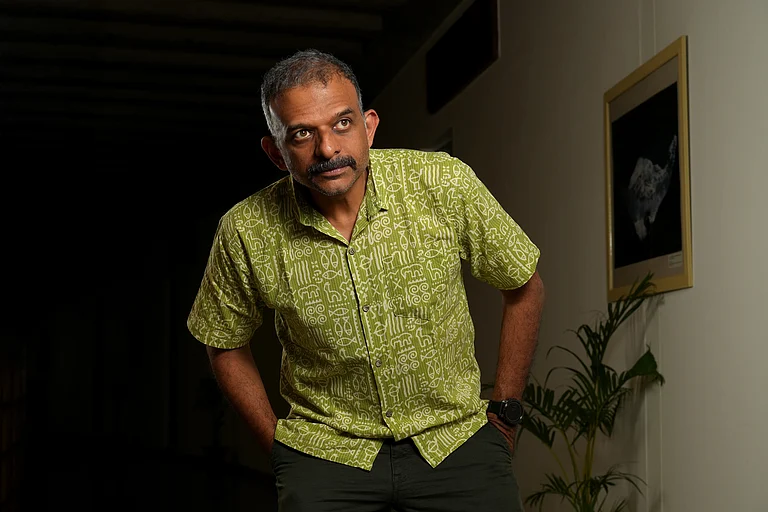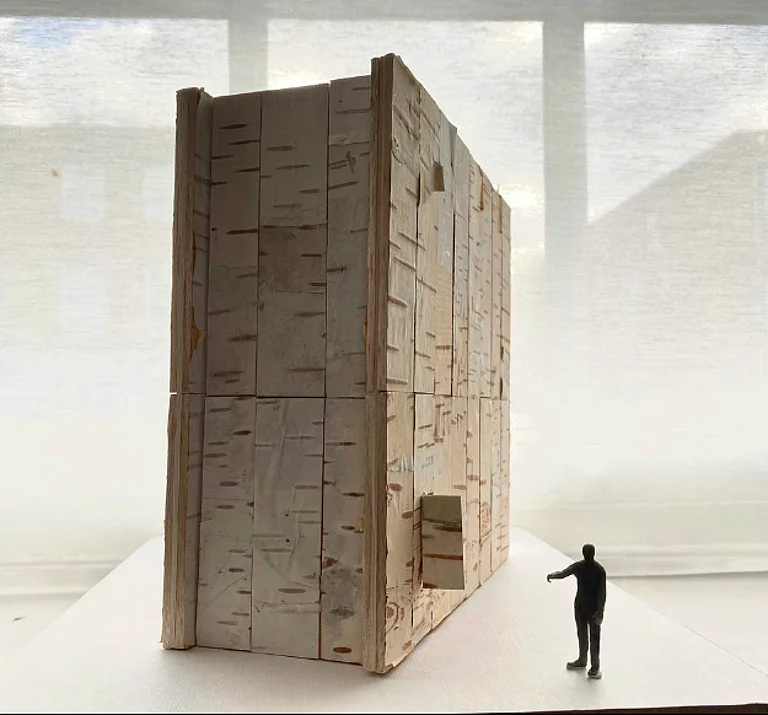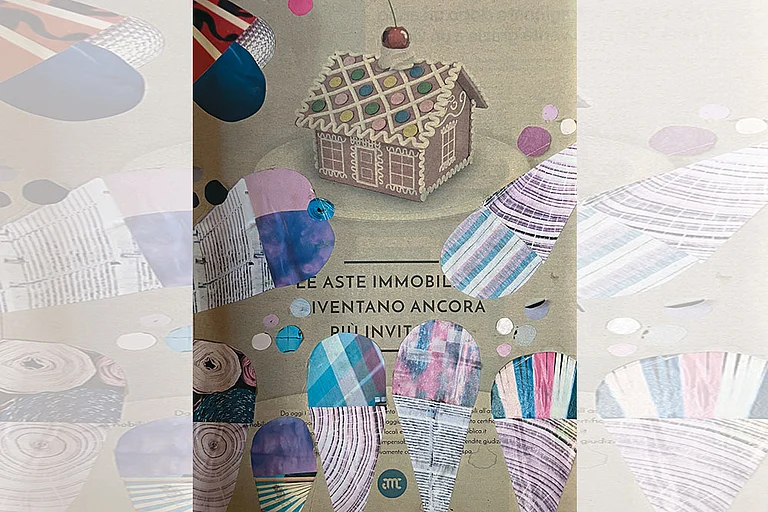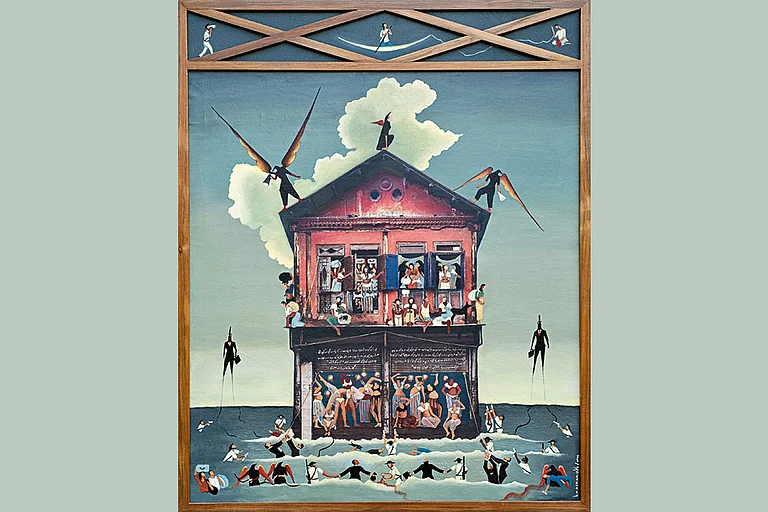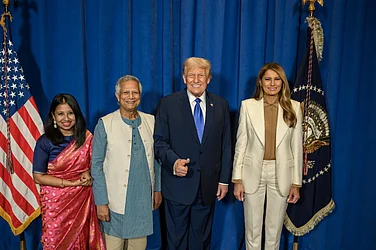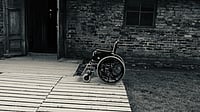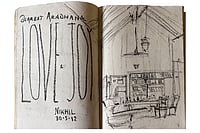Don’t ever be surprised
to see a rose shoulder up
among the ruins of the house:
This is how we survived.
—Mosab Abu Toha, Palestinian poet and writer, who was kidnapped by Israeli forces on November 19, and later released. When he fled Gaza, he only carried with him a book of his verses.
War is ontological devastation, too. How does one then write about war? How do we understand the loss then? How do we make sense of a war elsewhere? We turn to the poets, artists and people. They are living the war. There is a lot of smoke and dust. In the skies that I don’t see from here, there is a lot of fire.
Some might even say they are like fireworks. There is a play I remember by that name. By Palestinian writer Dalia Taha. Al’ab Nariya/Fireworks was produced in 2015 about children and people who carry their grief in their hearts as they go about their daily lives that are shaped by war. War fractures childhoods. I have seen too many bloodied toddler shoes in Gaza lying in the rubble in the last few weeks.
In the play, a 12-year-old girl Lubna wakes up with the sound of what she feels are fireworks. Her father asks her if she is wearing earplugs. The fireworks are in fact bombs. But her father tells her they are not. Overhead planes, he said, are ambulances. “There’s no one on the streets but us. You run that way and I’ll run this way. Whoever gets back to the front door first without getting shot, wins.”
Taha doesn’t name the town. In this town in Palestine, Lubna and Khalil are playing on the empty stairwell in their apartment block. They are friends. The little boy wears flashing red trainers and plays Ninja Turtle Games. The little girl talks about martyrdom, death. That’s how they live and play.
War’s ultimate victims are children. In Gaza, more than 8,000 children have been killed. The war is never elsewhere. The war shows us who we are. The war is a lot of things. Economics, politics, geopolitics, theo-politics. But more than all of these, the war is people.
There is always the pressure to be politically correct. We don’t condone the violence by Hamas on October 7, 2023. Hundreds of Israelis were killed and it was horrific and painful to read about them. Israel’s response has been to bomb the Gaza Strip. Israeli Prime Minister Benjamin Netanyahu has called the killing of civilians “collateral damage” and “unintentional”. Gaza is almost a place of ruins now. I don’t want to talk about proportionality. I don’t even want to talk about justice. Or even peace. That’s not my job. My job is to record and publish stories of people. Of children like Lubna and Khalil.
This issue is in protest of the reduction of people, their lives and their dreams in their minds and in the minds of others and of stories that have now become “content”. Numbers and clicks and subscribers don’t define a story. A story is there because it has a life independent of all these concerns. In that freedom of being, the story lives and travels. A story is there because it must be. A story must be set free. It must be the adversary of oppression and occupation.
All wars must be resisted. By pen and in our hearts. For weeks, we have been trying to reach out to ordinary people who have been posting about their daily lives on social media from Gaza and refugee camps. It was like a race. What if they are killed tomorrow, we would think. Then we’d keep that thought aside. We kept our faith. We held on to the hope that we’d be able to tell stories of wartime. It is not easy to record ordinary human conversations during a war, from cities and camps under what Palestinians call a “siege”. It can make one very, very sad.
In these 100 pages, Palestinians tell us their stories in their voices. We were inspired by the “documentary story” approach of the Belarusian investigative journalist and oral historian Svetlana Alexievich who also won the Nobel Prize for Literature for her work in 2015. “Right after the war,” Theodor Adorno wrote in shock, “writing poetry after Auschwitz is barbaric.” My teacher, Ales Adamovich, whose name I mention today with gratitude, felt that writing prose about the nightmares of the 20th century was sacrilege. Nothing may be invented. You must give the truth as it is. A “super-literature” is required. The witness must speak. Nietzsche’s words come to mind: “No artist can live up to reality. He can’t lift it,” he says.
In curating and compiling this record book as I’d like to refer to it, I have tried to understand this truth and how to write it. Artists can’t lift it, but they can share the burden. In The Things They Carried, a novel about the Vietnam War, Tim O’ Brien, who was there in the war, says that “story-truth is truer sometimes than happening-truth”. These stories are that. The truth as it is.
In her lecture, Alexievich says she became the human ear. Conversations are important. “I ask myself what kind of book I want to write about war. I’d like to write a book about a person who doesn’t shoot, who can’t fire on another human being, who suffers at the very idea of war. Where is he? I haven’t met him,” Alexievich says.
It is wartime. And all wartimes must be recorded.
Alexievich also says she is interested in little people. She says: “The little, great people, is how I would put it, because suffering expands people. In my books these people tell their own, little histories, and big history is told along the way. We haven’t had time to comprehend what already has happened and is still happening to us, we just need to say it. To begin with, we must at least articulate what happened. We are afraid of doing that, we’re not up to coping with our past.”
In these pages, we have spoken about those “little, great people” and about love, a difficult thing to talk about in these times where fear and hatred reign and we lose hope by the day. Even as I write this, bombs are falling on people, their homes and their children. Many are lost to us. We don’t want to pretend they are fireworks. The act of bearing witness is a primary responsibility of a journalist. That very act has been replaced by cacophony and othering of people in the media. This issue is polyphonic. That’s how we’d define it. A story of a pendant, a circus troupe, a theatre group, a dancer, a medical student and many more make up this issue. It is for the people, by the people and of the people.
I am also in awe of our reporters and everyone in the team who kept at it despite the odds, despite the feeling that we might not hear a single voice at all at the other end of the line. But we never abandoned hope and the story.
We are journalists. We are to bear witness. This issue is about dignity. Of people. It is to the people who have lost and suffered on either side. From us. It is for the friend from Ramallah who gifted me a frame of the Al-Aqsa Mosque, which I have kept for 17 years. I hope he is safe. Remember that a rose shoulders up among the ruins.








